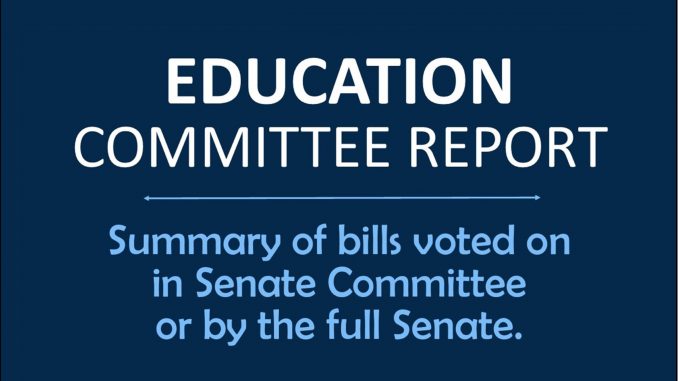
HF 598 – Sibling classroom placements
SF 603 – Funding for dual enrollment, allowing it to replace required courses
HF 637 — Reporting timeframe to BOEE
FLOOR ACTION:
HF 598 – Sibling classroom placements
HF 598 allows a parent or guardian of siblings in K-5 to request that their children be placed in the same classroom or different classrooms if they are in the same grade. Siblings that may fall under this bill would be twins, triplets or other multiples. It could also apply to foster kid, children from blended families, or children of different ages who are in the same grade. Exceptions may be made if the classroom teacher and parents determine that the siblings’ placement is “disruptive to the class.” The school district is not required to place siblings in separate classrooms if the request would require the school district to add an additional class at the siblings’ grade level.
[4/16: 44-5 (No: Celsi, Giddens, Hogg, J. Smith, R. Taylor; Excused: Shipley)]
SF 603 – Funding for dual enrollment, allowing it to replace required courses
SF 603 has three main provisions and is estimated to cost between $1.8 million and $3.9 million next year. It also will require a $108,000 for a new FTE at Iowa Department of Education. First, SF 603 increases supplementary weighting for liberal arts concurrent/dual enrollment from .46 to .50. This will cost the state an additional $1.2 million within the school funding formula next year.
Second, the bill allows concurrent enrollment programs to supplant rather than supplement some high school courses currently required to be “offered and taught” under the state’s educational standards. The bill allows one of these required science and math units and any of their career and technical (CTE) courses to taught under dual enrollment if the number of pupils enrolled exceeds five and the school district’s total enrollment does not exceed 600 pupils. Public school with more than 600 students may use college classes to count for one existing “offer and teach” requirements for science and math or any of their career and technical courses, but they will not receive additional/weighted funding. This provision is expected to cost anywhere from $487,300 to $2 million next year.
Third, the bill provides a new direct state standing unlimited fund to pay for concurrent community college enrollment of private school students. Private schools are limited to funding as a percent of public school per-pupil funding, in an effort to control costs/align with public-weighted funding. Like new student population thresholds for public schools, accredited private schools can use concurrent enrollment to supplant one science and math, or any of their CTE offer and teach requirements. They can get “extra funding” if they have student populations less than 200 students. If a nonpublic school has more than 200 enrolled students, they can still use community colleges to cover offer and teach requirements, but no extra/weighted funding will be provided. This provision is estimated to cost anywhere between $380,280 and $1 million next year.
[4/16: 49-0 (Excused: Shipley)]
HF 637 — Reporting timeframe to BOEE
HF 637 requires reporting of misconduct of school employees to the Board of Educational Examiners within 30 days. There is currently no required reporting timeframe. School districts must report any action taken against a licensed employee for misconduct, including soliciting or consummating a romantic relationship with student; falsifying grades or test scores; using public property for personal use; or being at school or school activities in possession or under the influence of drugs or alcohol.
[4/17: 50-0]
